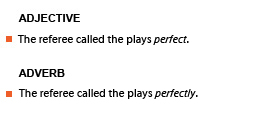Using adjectives to modify nouns
Adjectives ordinarily precede the nouns they modify:

Subject complements
Following linking verbs, adjectives can also function as subject complements. When an adjective functions as a subject complement, it describes the subject.

The verbs smell, taste, look, and feel sometimes, but not always, function as linking verbs. If the word following one of these verbs describes the subject, use an adjective; if the word following the verb modifies the verb, use an adverb.


The adjective cautious describes the detective; the adverb cautiously modifies the verb looked.
Linking verbs suggest states of being, not actions. Looked, for instance, can suggest a state of being, as in the first example, or it can be an action verb, as in the second example. To look cautious suggests the state of being cautious; to look cautiously is to perform an action in a cautious way.

The verb smell suggests a state of being, not an action. Therefore, it should be followed by an adjective, not an adverb.

The verb looked is a linking verb suggesting a state of being, not an action. The adjective good is appropriate following the linking verb to describe drawings.
Object complements
An object complement follows a direct object and completes its meaning. When an adjective functions as an object complement, it describes the direct object.

The adjective wise describes the direct object us.
Object complements occur with verbs such as call, consider, create, find, keep, and make. When a modifier follows the direct object of one of these verbs, use an adjective to describe the direct object; use an adverb to modify the verb.

The first sentence means that the referee considered the plays to be perfect. The second means that the referee did an excellent job of calling the plays.
Exercises:
Related topics: